Borovichi
Боровичи | |
|---|---|
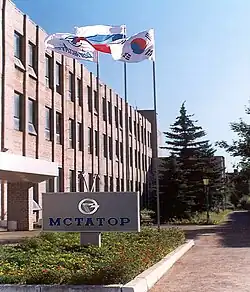 OAO Mstator building in Borovichi | |
.png.webp) Flag _(1772).png.webp) Coat of arms | |
Location of Borovichi | |
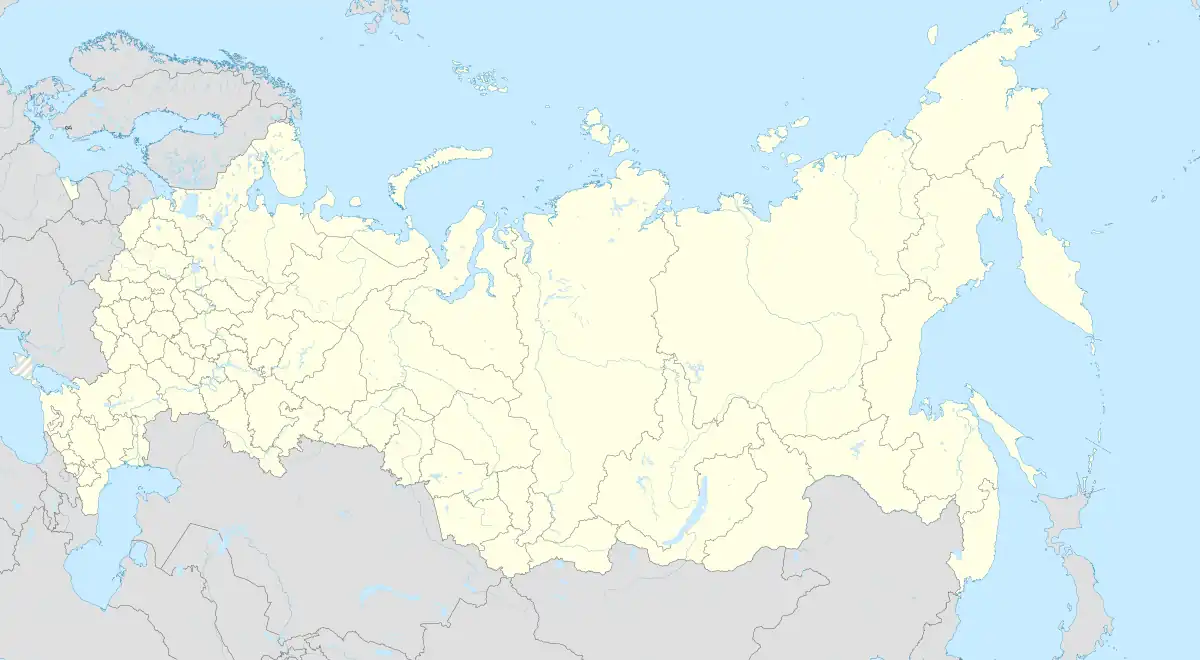 Borovichi Location of Borovichi 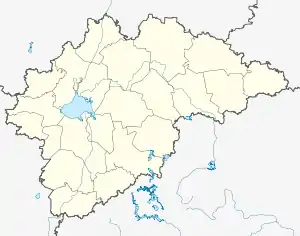 Borovichi Borovichi (Novgorod Oblast) | |
| Coordinates: 58°24′N 33°55′E / 58.400°N 33.917°E | |
| Country | Russia |
| Federal subject | Novgorod Oblast[2] |
| First mentioned | 1495 |
| Town status since | 1770[3] |
| Elevation | 90 m (300 ft) |
| Population | |
| • Total | 53,690 |
| • Estimate (2018)[5] | 50,144 (−6.6%) |
| • Rank | 307th in 2010 |
| • Subordinated to | town of oblast significance of Borovichi[2] |
| • Capital of | town of oblast significance of Borovichi,[2] Borovichsky District[2] |
| • Municipal district | Borovichsky Municipal District[6] |
| • Urban settlement | Borovichi Urban Settlement[6] |
| • Capital of | Borovichsky Municipal District,[6] Borovichi Urban Settlement[6] |
| Time zone | UTC+3 (MSK |
| Postal code(s)[8] | 174400, 174401, 174403–174409, 174411, 174421 |
| OKTMO ID | 49606101001 |
| Website | borovichi-adm |
| 2010 Census | 53,690[4] |
|---|---|
| 2002 Census | 57,755[9] |
| 1989 Census | 63,009[10] |
| 1979 Census | 59,646[11] |
Borovichi (Russian: Боровичи́) is the second largest town in Novgorod Oblast, Russia, located on the Msta River in the northern spurs of the Valdai Hills, 194 kilometers (121 mi) east of Veliky Novgorod, the administrative center of the oblast. As of the 2010 Census, its population was 53,690.[4]
History
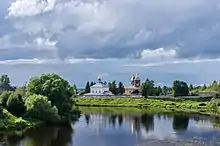
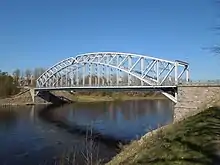
The Msta River was an important waterway since at least the 10th century, since it connected Novgorod with the basins of the Volga and the Northern Dvinas.[12] The settlement was first mentioned in 1495. It was granted town status in 1770 by Catherine the Great.[3] The main occupation of the town's inhabitants was piloting ships through the rapids of the Msta River that used to be a part of an important waterway connecting Central Russia with the Baltic Sea (hence a rudder appears on the town's coat of arms granted by Catherine the Great). However, by the mid-19th century, after opening of the Volga–Baltic Waterway and the Moscow-Saint Petersburg Railway, the significance of the Msta River as a transport route has decreased.
In the course of the administrative reform carried out in 1708 by Peter the Great, the area was included into Ingermanland Governorate (known since 1710 as Saint Petersburg Governorate). In 1727, separate Novgorod Governorate was split off. In 1773, Borovichsky Uyezd was established. In 1776, the area was transferred to Novgorod Viceroyalty. In 1796, the viceroyalty was abolished and Borovichsky Uyezd was transferred to Novgorod Governorate.
Sources of fire clay were discovered near the town in the 19th century, and the first fire brick manufacturing plant opened in the region in 1855. In 1878, a railway branch connected the town to Uglovka station of the Moscow-Saint Petersburg Railway, which allowed to establish several large fire brick plants in 1880. Now about half of the town's population is employed in the fire brick industry.
In 1905, the first arch bridge in Russia was built in Borovichi across the Msta.
On August 1, 1927, the uyezds were abolished, and Borovichsky District was established, with the administrative center in Borovichi. The district was a part of Borovichi Okrug of Leningrad Oblast. The town of Borovichi initially belonged to the district, but from 1930 it was elevated in status to that of a town of oblast significance. On July 5, 1944, Borovichsky District was transferred to newly established Novgorod Oblast and remained there ever since.[13]
Administrative and municipal status
Within the framework of administrative divisions, Borovichi serves as the administrative center of Borovichsky District, even though it is not a part of it.[2] As an administrative division, it is incorporated separately as the town of oblast significance of Borovichi—an administrative unit with the status equal to that of the districts (one of the three in Novgorod Oblast).[2] As a municipal division, the town of oblast significance of Borovichi is incorporated within Borovichsky Municipal District as Borovichi Urban Settlement.[6]
Economy
Industry
In Borovichi, there are enterprises of construction material production, timber industry, and food industry. There is also production of woodworking machines and of engines.
Transportation
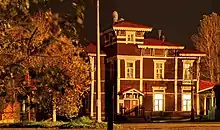
Borovichi is connected by a railroad with Uglovka and thus with the railway between Moscow and Saint Petersburg.
There are road connections to Tikhvin (via Lyubytino), Okulovka, and Pestovo. Borovichi is a local bus transportation hub.
Culture and recreation
The town of Borovichi contains one cultural heritage monument of federal significance—the arch bridge across the Msta—and additionally ninety-nine objects classified as cultural and historical heritage of local significance.[14]
The town is home to the Borovichi Regional Museum.[15]
The famous rapids of the Msta River popular among tourists are located just upstream from Borovichi.
Sports
- Bandy Club Borovichi is the only professional sports team in Novgorod Oblast.[16][17] In 2010, it was playing in the High Division (the first tier) of the Russian Bandy Super League, but in 2011 due to financial difficulties it was relegated to the First Division (the second tier). Their home arena has the capacity of 5,000.[18]
Notable people
- Alexey Kuznetsov, Soviet official
- Sergei Gennadyevich Yegorov, Russian association football player
Twin towns and sister cities
Borovichi is twinned with:
 Binghamton, New York, United States
Binghamton, New York, United States Haapsalu, Estonia
Haapsalu, Estonia Pereira, Colombia
Pereira, Colombia Suolahti (consolidated in 2007 with Sumiainen to make Äänekoski), Finland (status unknown)
Suolahti (consolidated in 2007 with Sumiainen to make Äänekoski), Finland (status unknown)
References
Notes
- ↑ Resolution #121
- 1 2 3 4 5 6 Law #559-OZ
- 1 2 Боровичи (in Russian). Географическая энциклопедия. Retrieved May 23, 2012.
- 1 2 3 Russian Federal State Statistics Service (2011). Всероссийская перепись населения 2010 года. Том 1 [2010 All-Russian Population Census, vol. 1]. Всероссийская перепись населения 2010 года [2010 All-Russia Population Census] (in Russian). Federal State Statistics Service.
- ↑ "26. Численность постоянного населения Российской Федерации по муниципальным образованиям на 1 января 2018 года". Federal State Statistics Service. Retrieved January 23, 2019.
- 1 2 3 4 5 Law #369-OZ
- ↑ "Об исчислении времени". Официальный интернет-портал правовой информации (in Russian). June 3, 2011. Retrieved January 19, 2019.
- ↑ Почта России. Информационно-вычислительный центр ОАСУ РПО. (Russian Post). Поиск объектов почтовой связи (Postal Objects Search) (in Russian)
- ↑ Russian Federal State Statistics Service (May 21, 2004). Численность населения России, субъектов Российской Федерации в составе федеральных округов, районов, городских поселений, сельских населённых пунктов – районных центров и сельских населённых пунктов с населением 3 тысячи и более человек [Population of Russia, Its Federal Districts, Federal Subjects, Districts, Urban Localities, Rural Localities—Administrative Centers, and Rural Localities with Population of Over 3,000] (XLS). Всероссийская перепись населения 2002 года [All-Russia Population Census of 2002] (in Russian).
- ↑ Всесоюзная перепись населения 1989 г. Численность наличного населения союзных и автономных республик, автономных областей и округов, краёв, областей, районов, городских поселений и сёл-райцентров [All Union Population Census of 1989: Present Population of Union and Autonomous Republics, Autonomous Oblasts and Okrugs, Krais, Oblasts, Districts, Urban Settlements, and Villages Serving as District Administrative Centers]. Всесоюзная перепись населения 1989 года [All-Union Population Census of 1989] (in Russian). Институт демографии Национального исследовательского университета: Высшая школа экономики [Institute of Demography at the National Research University: Higher School of Economics]. 1989 – via Demoscope Weekly.
- ↑ Всесоюзная перепись населения 1979 г. Национальный состав населения по регионам России [All Union Population Census of 1979. Ethnic composition of the population by regions of Russia] (XLS). Всесоюзная перепись населения 1979 года [All-Union Population Census of 1979] (in Russian). 1979 – via Demoscope Weekly (website of the Institute of Demographics of the State University—Higher School of Economics.
- ↑ "История города и городского управления" (in Russian). Администрация Боровичского муниципального района. Archived from the original on November 5, 2012. Retrieved May 23, 2012.
- ↑ Снытко, О. В.; et al. (2009). С. Д. Трифонов; Т. Б. Чуйкова; Л. В. Федина; А. Э. Дубоносова (eds.). Административно-территориальное деление Новгородской губернии и области 1727-1995 гг. Справочник (PDF) (in Russian). Saint Petersburg. p. 96. Retrieved May 22, 2011.
{{cite book}}: CS1 maint: location missing publisher (link) - ↑ Памятники истории и культуры народов Российской Федерации (in Russian). Russian Ministry of Culture. Retrieved June 2, 2016.
- ↑ Боровичский краеведческий музей (in Russian). Российская сеть культурного наследия. Archived from the original on December 30, 2011. Retrieved May 23, 2012.
- ↑ "Хоккейный клуб "Боровичи"" (in Russian). Хоккейный клуб «Боровичи». Archived from the original on February 13, 2012. Retrieved January 23, 2012.
- ↑ Спасти ХК "Боровичи". Возможно? (in Russian). bandynet.ru. Archived from the original on March 9, 2012. Retrieved May 23, 2012.
- ↑ Стадион «Металлург», Боровичи (in Russian). Федерация хоккея с мячом России. Retrieved December 1, 2012.
Sources
- Новгородская областная Дума. Областной закон №559-ОЗ от 11 ноября 2005 г. «Об административно-территориальном устройстве Новгородской области», в ред. Областного закона №730-ОЗ от 26 февраля 2015 г. «О внесении изменений в Областной закон "Об административно-территориальном устройстве Новгородской области"». Вступил в силу 1 января 2006 г. Опубликован: "Новгородские ведомости", №75, 23 ноября 2005 г. (Novgorod Oblast Duma. Oblast Law #559-OZ of November 11, 2005 On the Administrative-Territorial Structure of Novgorod Oblast, as amended by the Oblast Law #730-OZ of February 26, 2015 On Amending the Oblast Law "On the Administrative-Territorial Structure of Novgorod Oblast". Effective as of January 1, 2006.).
- Администрация Новгородской области. Постановление №121 от 8 апреля 2008 г. «Об реестре административно-территориального устройства области», в ред. Постановления №408 от 4 августа 2014 г. «О внесении изменений в реестр административно-территориального устройства области». Опубликован: "Новгородские ведомости", №49–50, 16 апреля 2008 г. (Administration of Novgorod Oblast. Resolution #121 of April 8, 2008 On the Registry of the Administrative-Territorial Structure of Novgorod Oblast, as amended by the Resolution #408 of August 4, 2014 On Amending the Registry of the Administrative-Territorial Structure of Novgorod Oblast. ).
- Новгородская областная Дума. Областной закон №373-ОЗ от 22 декабря 2004 г. «Об установлении границ муниципальных образований, входящих в состав территории Боровичского муниципального района, наделении их статусом городского и сельских поселений, определении административных центров и перечня населённых пунктов, входящих в состав территорий поселений», в ред. Областного закона №216-ОЗ от 1 марта 2013 г. «О внесении изменений в некоторые областные законы, содержащие перечни населённых пунктов, входящих в состав территорий поселений». Вступил в силу со дня, следующего за днём официального опубликования. Опубликован: "Новгородские ведомости", №2, 12 января 2005 г. (Novgorod Oblast Duma. Oblast Law #373-OZ of December 22, 2004 On Establishing the Borders of the Municipal Formations Within the Territory of Borovichsky Municipal District, on Granting Them the Status of Urban and Rural Settlements, on Establishing Their Administrative Centers, and on Compiling the Lists of Inhabited Localities Within the Settlement Territories, as amended by the Oblast Law #216-OZ of March 1, 2013 On Amending Various Oblast Laws Containing the Lists of Inhabited Localities Within the Settlement Territories. Effective as of the day following the day of the official publication.).
External links
- Official website of Borovichi (in Russian)
- Borovichi Business Directory (in Russian)